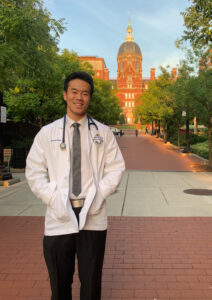Takeaway
Creative writing may enhance our ability to recognize and understand conflicting perspectives in order to better empathize with our patients.

Connecting with Patients | September 30, 2020 | 2 min read
By Howard Chang, Medical Student, Johns Hopkins Medicine
COVID-19
There will be no more
Wisdom, integrity, and compassion
Among us, and only through
Self-centeredness
We will overcome this
(Read from top-to-bottom, then bottom-to-top.)
Excerpt from the poem “Social Distancing,” published in “Academic Psychiatry,” 2020.
Near the beginning of the pandemic in the U.S., I wrote a reverse poem called “Social Distancing.” I tend to write whenever something bothers me, and the way many people were responding to social distancing guidelines troubled me. Writing has always been cathartic because it helps me to consider why I’m feeling a certain way, and whether that feeling is legitimate in light of other ways I could be feeling. I place myself, as best I can, in the position of someone else who may have just as powerful a thought or feeling as I am, but in the opposite direction. I wrestle, cognitively and emotionally, with their positions as well as my own. I reconcile them when I can, and when I feel strongly about my own position, I try to summon appropriate evidence.
I tried to understand why so many people were blatantly ignoring social distancing guidelines meant to protect themselves and people they cared about. The word “freedom” came to mind, and the poem had to be a reverse poem in order to capture the dichotomy inherent in the notion of freedom as I perceived it. I saw how freedom could be exercised for life, liberty, and happiness, and how it allowed people to serve others joyfully, without restraint. I also saw how freedom was easily abused for selfish gain.
Exercising creativity and perspective-taking through poetry is new for me, but this endeavor met a gnawing need that I had to better understand what was going on in the hearts and minds of those around me during these trying times. As current and future clinicians, we regularly enter into the world of a patient’s suffering whose lived experiences often differ vastly from our own. In caring for others, we may confront ideological views that make us bristle with frustration.
These triggers can be invitations to something more profound than an immediate felt need to defend our own points of view—an opportunity to reflect on our patients’ values and our own. By better knowing ourselves and our patients, we can grow in the empathy that is so crucial during moments of tense disagreement. I have discovered reverse poetry to be an exciting new outlet for me to participate in such reflection. May we each exercise our creative brains in our own unique ways in order to know and love ourselves and patients more wisely and fully.

